Kommer du ihåg när du först konfigurerade din WordPress-webbplats och allt verkade perfekt, tills du märkte den irriterande /wordpress/ i din URL? Vi har varit där. Det är en av dessa små detaljer som kan få din professionella webbplats att se ut som ett amatörprojekt.
Det här extra /wordpress/ i din webbadress är inte bara ett estetiskt problem. Det kan påverka din webbplats SEO och göra din webbadress onödigt lång och komplicerad. Efter att ha hjälpt otaliga WordPress-användare genom detta problem på WPBeginner, vet vi exakt hur frustrerande det kan vara.
Idag visar vi dig det rätta sättet att ta bort /wordpress/ från din webbplats URL. Vi har testat den här metoden på hundratals webbplatser, och den fungerar varje gång när den görs på rätt sätt. Låt oss fixa din URL-struktur en gång för alla.
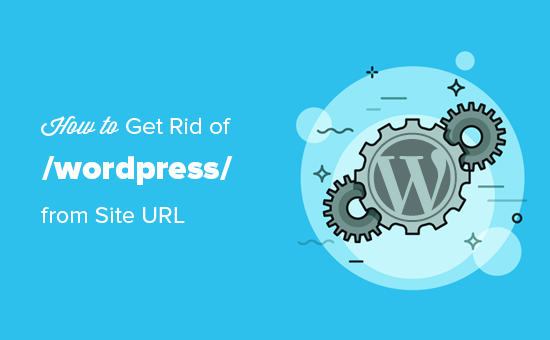
Note: Den metod som visas i denna tutorial fungerar även för andra subdirectories.
Varför har min website /wordpress/ i sin URL?
WordPress är ganska enkelt att installera, och de flesta WordPress webbhotell erbjuder snabba WordPress installatörer i deras webbhotell kontrollpaneler.
Vissa Beginnare som installerar sin WordPress website manuellt kan dock råka installera den i en subdirectory. Oftast har denna subdirectory namnet “wordpress”.
Detta händer vanligtvis eftersom användare slutar uppladdare wordpress foldern de hittar i den officiella WordPress.org download.
Låt oss ta en titt på hur du enkelt kan fixa detta och bli av med /wordpress/ från din sites URL. Vi kommer att täcka tre metoder, och du kan använda dessa länkar för att hoppa till den du vill använda:
Metod 1: Börja helt enkelt om med en new install av WordPress
Om du precis har installerat WordPress och det inte finns något content på din website kan du börja om från början.
Radera bara den aktuella installationen och följ instruktionerna i vår WordPress installation tutorial för att korrekt installera WordPress igen.
Om du redan har add to content till din website finns det två enkla sätt att remove /wordpress/ från din sites URL. Vi kommer att täcka dem i metoderna 2 och 3.
Metod 2: Ändra din WordPress Site Address
Om du har en etablerad site WordPress är den här metoden enklare och snabbare. Nackdelen med den här metoden är att dina media files, t.ex. images, fortfarande kommer att använda /wordpress/ i sin URL.
Vissa SEO-verktyg kan flagga dessa webbadresser för mediefiler som inkonsekventa med din huvuddomän, och besökare kommer fortfarande att se /wordpress/ när de högerklickar eller inspekterar bilderna.
Först måste du logga in i ditt WordPress-adminområde och gå till Inställningar ” Allmänt. Här ser du två olika URL-inställningar.
Inställningen “WordPress Address (URL)” talar om för WordPress var dina kärnfiler är installerade. Inställningen “Site Address (URL)” talar om för WordPress vilken URL besökare ska besöka för att komma åt din webbplats.
Du måste ändra alternativet “Site Address” och peka det mot din rotdomän, t.ex. https://www. example.com och lämna alternativet “WordPress Address” som det är.
När du har gjort det klickar du på knappen “Save Changes” för att lagra dina inställningar.
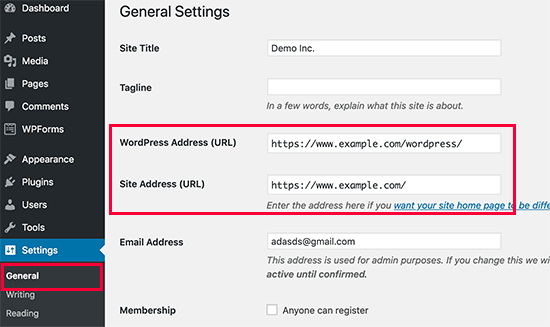
Därefter måste du ansluta till din website med hjälp av en FTP-klient. Väl där går du till /wordpress/ directory och downloadar filerna .htaccess och index.php till din dator.
Om du inte kan lokalisera .htaccess-filen kan du behöva tvinga din FTP-klient att visa dolda filer. Om du använder Filezilla måste du klicka på Server i menyraden och välja alternativet “Force showing hidden files”.
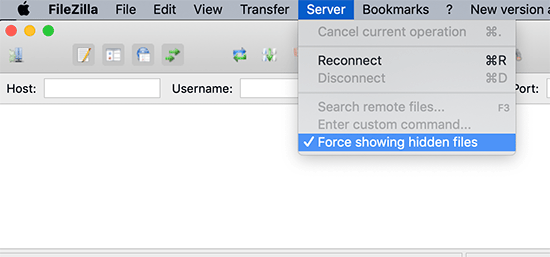
När du har downloadat båda filerna till din dator måste du öppna filen index.php i en textredigerare som gillar Notepad. I den här filen hittar du en rad som gillar detta:
1 | require( dirname( __FILE__ ) . '/wp-blog-header.php' ); |
Den här raden hämtar filen wp-blog-header.php, som är obligatorisk för att ladda din WordPress site.
Vad du behöver göra nu är att enter filens korrekta location genom att ersätta den befintliga raden med den här:
1 | require( dirname( __FILE__ ) . '/wordpress/wp-blog-header.php' ); |
Save your changes and upload both index.php and .htaccess files from your desktop computer to the root of your domain using FTP.
Rotmappen är den parent-mapp som innehåller mappen “wordpress”, och den brukar anropas /www/ eller /public_html/.
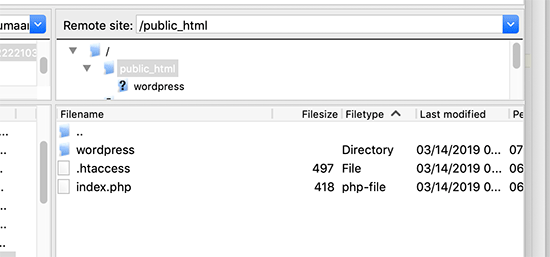
Nu är allt klart. You can now visit your website using the root domain, and everything will work fine.
1 | https://example.com |
Men om du behöver logga in på din WordPress-admin, måste du fortfarande gå till wp-admin i “wordpress” directory så här:
1 | https://www.example.com/wordpress/wp-admin |
Metod 3: Flytta WordPress till root directory
Denna metod är mer omfattande och flyttar permanent din WordPress site från subdirectory till rotmappen på din website.
Step 1: Skapa ett Duplicator-paket
Först måste du installera och aktivera det kostnadsfria pluginet Duplicator på din webbplats. För mer information, se vår steg-för-steg przewodnik om hur du installerar ett WordPress-plugin.
Obs: Vi kommer att använda gratisversionen av Duplicator för den här poradniken. Du kan dock uppgradera till Duplicator Pro för att få obegränsade säkerhetskopior, schemalagda säkerhetskopior, dra och släpp importować och mer.
Vid aktivering måste du besöka sidan Duplicator ” Säkerhetskopior och sedan klicka på knappen “ Skapa ny”.
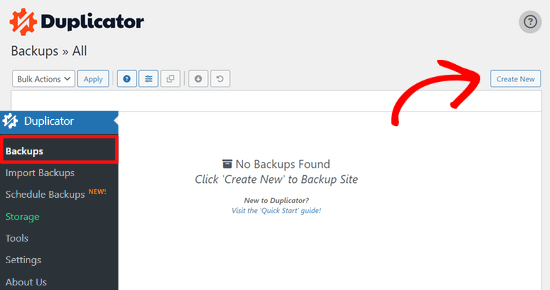
Detta startar Duplicator-guiden, som skapar ett installationspaket av hela din webbplats.
Du kan lägga till ett namn för din säkerhetskopia och klicka på knappen “Next” för att fortsätta.
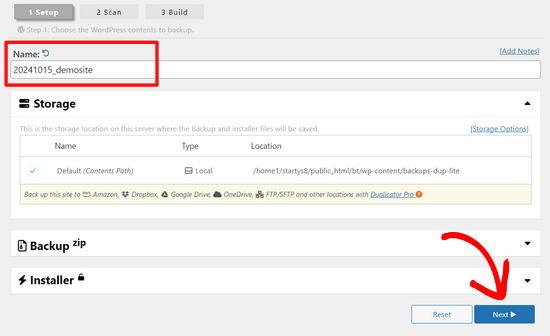
Därefter kommer plugin att köra några skanningar. Om allt ser bra ut kan du klicka på knappen “Bygg” längst ner.
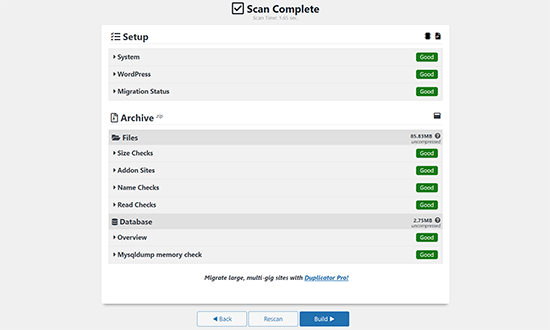
Duplicator kommer nu att skapa ett paket och uppmana you att downloada det tillsammans med skriptet för installeraren.
Gå vidare och ladda ner båda filerna till din dator genom att klicka på knappen “Ladda ner båda filerna”.
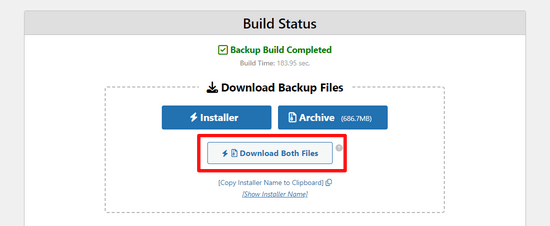
Step-by-Step 2: Skapa en New: Database för en ny install av WordPress
Du kan använda den befintliga WordPress-databasen, men det är bättre att skapa en new så att din gamla databas är säker och oförändrad. På så sätt kan du enkelt återgå till din site om något skulle gå fel.
Du måste gå till ditt värdtjänstkontos cPanel-instrumentpanel, bläddra ner till avsnittet “Databaser” och sedan klicka på ikonen “MySQL-databaser”. Din instrumentpanel kan se ut som på följande skärmdump, men detta kan variera beroende på din hostingleverantör.

Därefter anger du helt enkelt ett namn för din database.
Därefter ska du klicka på knappen “Create Database”.

cPanel kommer nu att skapa en new database åt you. Efter det måste du rulla ner till “MySQL Users” section.
Nu måste du ange användarnamn och password för din nya användare av databasen och clicka på knappen “Create a User”.
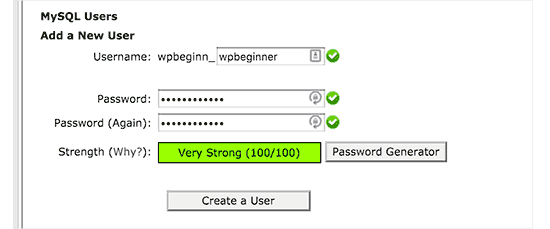
Nu måste du tilldela behörigheter för databasen till den nya användaren.
Rulla ner till sektionen “Add User to Database” (Lägg till användare i databasen). Välj den användare i databasen som du har skapat i dropdown-menyn bredvid fältet “User” och välj sedan databasen. Slutligen klickar du på knappen “Add”.

Din new database är nu redo att användas för en ny install WordPress.
Step 3: Run Wizard för Duplicator
Nu måste du uploada Duplicator archive-paketet och filen installer som du downloadade tidigare till root directory på din website.
Detta är den directory som innehåller foldern/wordpress/.
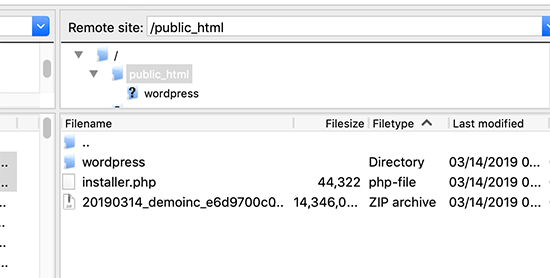
När du har uppladdat båda filerna öppnar du skriptet för installeraren i ett fönster i webbläsaren. You will need to enter your site’s root URL and then prefix it with /installer.php.
1 | https://example.com/installer.php |
Detta öppnar guiden för att installera Duplicator.
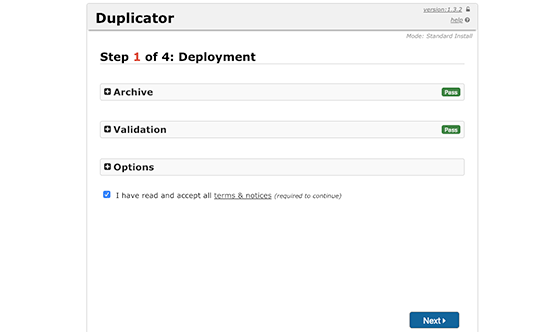
Kontrollera boxen Terms and Conditions och klicka sedan på knappen “Next” för att fortsätta.
Därefter kommer du att bli ombedd att ange information om databasen. Enter informationen för den database som vi skapade tidigare i steg 2.
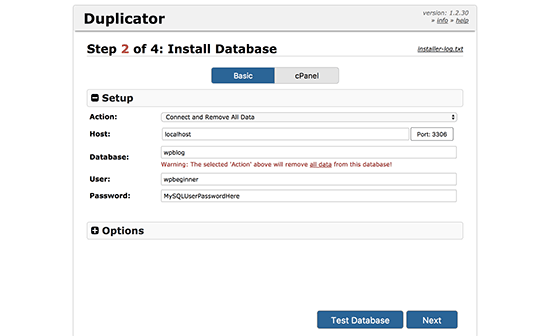
När du har enter informationen om databasen klickar du på knappen “Next” för att fortsätta. Duplicator kommer nu att packa upp din backup av WordPress-databasen från archive till din new database.
Därefter kommer den att be dig att updating the site URL and path. You behöver inte göra något här, eftersom den nya URL:en och sökvägen kommer att upptäckas automatiskt. Men om den inte gör det kan du manuellt enter detaljerna här.
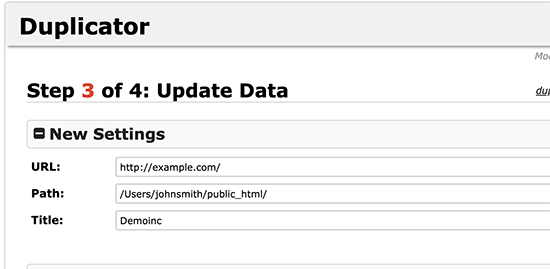
Duplicator kommer nu att slutför migreringen.
You will be able to click on the “Admin Login” button to access your website at the new location.
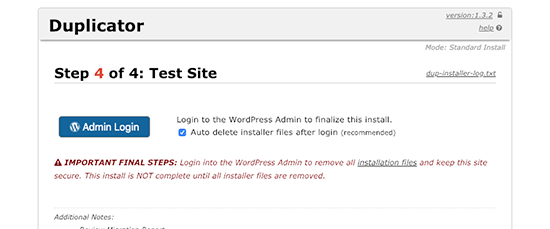
Step-by-Step 4: Ställ in omdirigeringar från subdirectory till rotmapp
Grattis, du har utan problem flyttat din WordPress site från subdirectory till rotmappen.
Nu är det dags att ställa in redirects så att dina användare och search engines kan hitta din websites new location.
Först måste du ansluta till din WordPress site med hjälp av en FTP-klient och sedan ta bort den gamla /wordpress/ foldern.
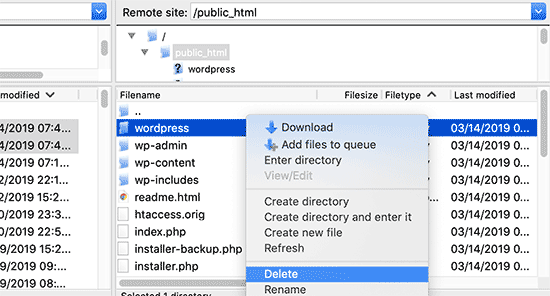
Därefter växlar du till admin area på din site i WordPress. Eftersom du har flyttat den till roten av din website, kommer din WordPress admin URL att gilla detta:
1 | https://example.com/wp-admin |
Nu måste du installera och aktivera pluginet Redirect. För mer detaljer, se vår Step-by-Step guide om hur du installerar ett plugin för WordPress.
Vid aktivering måste du besöka Tools ” Redirect page. Pluginet kommer nu att visa dig en installationsguide. Klicka bara på knapparna “Continue Setup” och sedan “Finish Setup”.
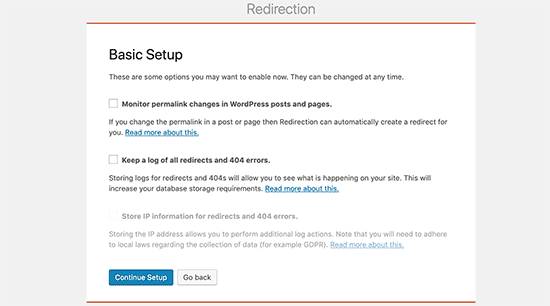
Därefter måste du byta till tabben “Redirects” och add new redirect.
First, you need to check the “REGEX” box at the corner of the first field.
Därefter går du till fältet “Source URL” och lägger till https://example.com/wordpress/.*Nästgår du till fältet “Target URL” och lägger till https://example.com/$1.
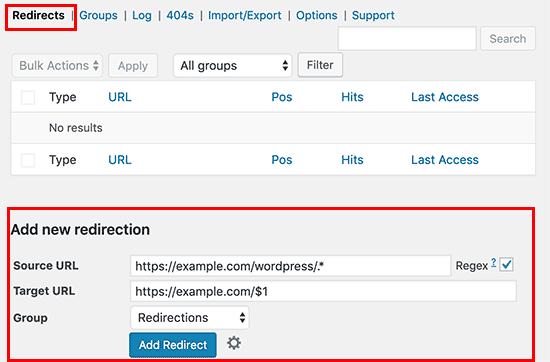
Glöm inte att ersätta “example.com” med ditt eget domain name. Se sedan till att du klickar på knappen “Add Redirect” för att save dina ändringar, och you are done.
Ett annat verktyg du kan använda för att redirecta posts och pages är All in One SEO (AIOSEO). Vi visar dig hur du omdirigerar besökare som använder gamla URL:er som innehåller /wordpress/ till din nya site location i vår Beginner’s guide on how to do full site redirects in WordPress.
Dessutom kan du aktivera 404 error tracking för att fånga upp eventuella trasiga links så att du inte förlorar keyword ranking.
Från och med nu kommer alla användare som försöker komma åt din website med /wordpress/ i URL:en automatiskt att redirectas till korrekta posts med din nya rot-URL.
Expertguider om hur du ändrar URL:er i WordPress
Vi hoppas att den här artikeln hjälpte dig att lära dig hur du kan bli av med /wordpress/ från din WordPress-webbplats URL. Du kanske också vill se några andra guider relaterade till att ändra webbadresser i WordPress:
- Så här ändrar du din WordPress-webbplats URL (steg för steg)
- Så här uppdaterar du enkelt URL:er när du flyttar din site i WordPress
- Så här tar du bort siffror från WordPress URL:er
- Så här tar du bort datumet från WordPress URL:er
- Hur man tar bort v=XXXX String från WordPress URL:er
- Hur man tar bort Parent Slug från Child Page URL i WordPress
- Så här ändrar du standard URL-sluggen för search i WordPress
- Så här addar du en Custom Login URL i WordPress (Step-by-Step)
- Guide för Beginnare: Så här hittar du din URL för login på WordPress
- Så här flyttar du WordPress från HTTP till HTTPS på rätt sätt (Beginner’s Guide)
If you liked this article, then please subscribe to our YouTube Channel for WordPress video tutorials. You can also find us on Twitter and Facebook.





Brenda
Thank you so much for this tutorial! So helpful.
I followed step #2 and all the pages on my site work now without the /wordpress in the URL, EXCEPT for the homepage. I updated the Site URL in Settings > General, but for some reason the homepage still redirects from mysite.com to mysite.com/wordpress.
Any idea why this might be happening? Thanks in advance!
WPBeginner Support
From the sound of the issue, we would recommend checking your index.php and htaccess are both in the correct folder for a likely reason.
Admin
Brenda
Thanks so much for your response. Figured out the issue!
WPBeginner Support
Glad to hear!
Adrian
Not sure if this related, on initial set up should you you use the www dot …. com or just your sitename dot… com
WPBeginner Support
That is a different situation that we cover in our guide below. WWW vs non-WWW is personal preference:
https://www.wpbeginner.com/beginners-guide/www-vs-non-www-which-is-better-for-wordpress-seo/
Admin
Lilly Walker
I followed Method 1: Change WordPress Site Address
changed the site address with out /mywpfolder
and downloaded the ht.access and the index file – (they dont match your eg but just added the /mywpfolder etc
and uploaded the htaccess and the index files back to the root directory
BUT
the correct front page came up and then clicked on a link it came up but clicked on a link then and it 404’d.
my guess is that some pages have urls manually put in but how do I search and replace these?
Alice K
Hi!
First, thank you very much!
I followed the second method, and now accessing the admin page works without adding “/wordpress” in the URL.
But when I try to access my website I still have to add “/wordpress” to the URL?!
Can anyone help? Where have I gone wrong?
WPBeginner Support
The site is likely active in the old location, you should should still be able to see your login if you go to yourdomain/wp-login.php
Admin
sginader
Thank you! I’m a WP novice so your step by step instructions was perfect. I do have a question – I followed Method 1 – does the redirect add to the site loading time? I ask because my site takes very long to load. Thank you!
WPBeginner Support
While it adds a small amount to the loading time, it shouldn’t add enough to be noticeable. If this increase in load time was recent then you may want to check with your host to ensure there isn’t something conflicting with the redirect you set up.
Admin
Nkosiyapha
This was very helpful. Thank you very much
WPBeginner Support
You’re welcome
Admin
Rachel
I have a question: if I use method 1, do I have to change all url links of my posts and images? My blog are actually inside a folder and I want to make a redirection to the root domain. It’s not clear…
WPBeginner Support
For the first method, you shouldn’t need to redirect your posts.
Admin
birgit van Munster
Hi, I made the change in the index.pho file as directed and moved the two files to the root directory, but I get this error message:
Parse error: syntax error, unexpected ” );’ (T_ENCAPSED_AND_WHITESPACE) in /data/40/5/47/114/5373603/user/6433782/htdocs/index.php on line 17
I think line 17 is exactly as described in the instructions, please help!
WPBeginner Support
You may want to ensure you copied the code correctly and pasted it on a new line. You may want to take a look at our article here: https://www.wpbeginner.com/beginners-guide/beginners-guide-to-pasting-snippets-from-the-web-into-wordpress/
Admin
Bella
Thank you so much! The guide I was reading didn’t mention the .htaccess part. This guide fixed the error on my site. Great work!
Bart
Hi!
Great tutorial, and my URL now redirects (woohoo!)
However when I go the settings tab and change the site title to the one without /wordpress, the site works fine except for the home page, which gives an error.
What am I missing here…?
TROP ICSU
Hi there!
I have my site hosted on my server. WordPress dir is located in /home/myuser/.
I tried to follow your steps by copying the updated index.php and .htaccess into same dir level where wordpress dir is. But no success.
Can you pl guide? Thank you.
Rachel
If I have a wordpress instance in a subdirectory and I just want to delete it and not move it, can I just delete the folder, or do I need to go through some kind of un-install procedure so it is removed from the database as well?
WPBeginner Support
Hi Rachel,
Yes you can delete it. However, we will still recommend to download it as a backup before deleting it.
Admin
Michael Hayman
Hey, so i had a go at this, and for some reason i am now faced with an HTTP 500 error.
Not sure where i went wrong, but i don’t seem to be able to get it back to normal.
Any ideas would be much appreciated.
I have tried resetting the index.php back to default as well as the .htacess file with no avail.
To make matters more difficult i get the same HTTP 500 message when trying to login to the wordpress admin as well.
Clarisse
Hi Michael,
My folder is called “/wp” instead of “/wordpress”, so probably yours too!
That might be the problem…
Louise
I had the same problem, and my folder was called wp. I just went back to the index.html file and changed it from wordpress to wp and problem solved! Such a helpful article, this was hanging over my head for months and so glad to have it fixed!
Gareth Botha
Hi Syed, many thanks for all these, I have been postponing my site for over a year now as it was simply too intimidating. I had however made the fault of installing wordpress to the subdomain /wp and set the entire site up. Just sorted it out with you tut above. I have however come across a new problem, my home/landing page no longer loads my blog posts. How do I resolved this? I also get a redirect error as well.
WPBeginner Support
Hi Gareth,
Good luck with your new website. Wish we could be more helpful, but it is up to the theme and your website settings. Please see our WordPress troubleshooting guide to figure out whats causing it.
Admin
Yan Xun
Hi, I followed these steps and my website is working fine. Only issue is now I can’t seem to load my theme’s UX Builder for my site.
does this method cause any issue if I am using a theme UX builder?
WPBeginner Support
Hi Yan Xun,
Here is what you can try. First create a backup of your website. After that Uninstall the UX builder by visiting the plugins page, now install and activate it again.
If it comes packaged with your theme, then again create a backup of your website. After that you need to download a fresh copy of your theme. Next, temporarily switch your WordPress site to a default WordPress theme like TwentySeventeen. Delete your old theme and then install it from the zip file you downloaded earlier.
Admin
Gina
Help! I followed your tutorial for removing wordpress. Now I can’t get into the site or admin.
Getting the following:
Warning: require(/home/content/09/8001609/html/wordpress/wp-blog-header.php) [function.require]: failed to open stream: No such file or directory in /home/content/09/8001609/html/index.php on line 17
Fatal error: require() [function.require]: Failed opening required ‘/home/content/09/8001609/html/wordpress/wp-blog-header.php’ (include_path=’.:/usr/local/php5/lib/php’) in /home/content/09/8001609/html/index.php on line 17
Marko
Done that, and ‘/wordpress’ from addressbar is gone, but Google still lists it with it in the search. For example:
WPBeginner Support
Hi Marko,
You will need to redirect those users. See our guide on how to setup redirects in WordPress.
Admin
Andrew
Thanks guys i love u <3
Priyanka
This tutorial is a life saviour. Thank you so much.
Beth
Thanks for your helpful website. I downloaded .htaccess and index.php. My index php says index.php4 The line on it says this: .htaccess disapears when I download it to the desktop. In ftp, they are located in the same folder as the wordpress1 folder is located. It appears to be the root directory. The site has the url with wordpress1 at the end of it. I’m not sure what to do, and don’t want to crash the site!
Thanks,
Beth
Lee Graham
Can I ask why you download .htaccess only to upload it again?, there is no mention of edting htaccess so why download in the first place ?
Brandi
I believe he’s asking us to download the one from the /wordpress/ subdirectory and then upload it to the / root (which is up one level). I hope that helps
Manpreet Kaur
HI,
Thankyou so much for these helpful tutorials my one problem is solved but there is one another. When I search on google and type my website address it shows index of link instead of my website name. When I click on that link it opens my website. Can anyone help me to display my website URL on google instead of index of URL.
Ariadne1985
THANK YOU SO MUCH!!!
I spent hours working on it (failure) and then found your site + explanation.
SUPERB!
Filip Kevely
1. I have moved my example.com WP installation into subfolder (let’s call it “secret-sub”).
2. Typing example.com/wp-login.php automatically re-directs me to example.com/secret-sub/wp-login.php :((
((Note: Visiting no other part of my web page shows this subfolder name as part of URL address; visitors see only example.com everywhere.))
Is this normal behaviour?
And if so – what’s actually the point of having your WP installation in “secret” subfolder – when basic /wp-login.php and /wp-admin brute attack re-directs to URL showing the “secret subfolder” name??
Any clear explanation will be very much appreciated. Thx.
WPBeginner Support
Hi Filip Kevely,
When you install another WordPress instance in a sub-folder it creates a conflict for WordPress permalinks. To fix that you need to add this code to your sub-folder site’s .htaccess file:
# BEGIN WordPress<IfModule mod_rewrite.c>RewriteEngine OnRewriteBase /secret-sub/RewriteRule ^index\.php$ – [L]RewriteCond %{REQUEST_FILENAME} !-fRewriteCond %{REQUEST_FILENAME} !-dRewriteRule . /secret-sub/index.php [L]</IfModule>#ENDWordPress1-click Use in WordPress
Don’t forget to replace secret-sub with the actual subfolder name.
Admin
Charlotte Tomic
How do you get rid of FEATURED CONTENT on your blog? I eliminated footers without a problem, but can’t get rid of featured content showing up on the blog front page.
Jade
Hi there, I am pulling my hair out…….I dont have the wordpress address url or the Site Address url under settings general! I have one site with nothing on it with my web address and then another site which I have fixed up with the same name but then wordpress.com at the end, any help would be greatly appreciated.
Arif
I have followed given the instruction but I am facing problem my website is not open correct and wp login penal is not coming please help me quickly.
Bright Bernard
Hello,
I successfully got rid of /wordpress from site URL following the instructions in the tutorial but once i installed yoast for seo , google shows the pages with /worpress in its search results.how can we remove that from google search results also?
Blane
Thank you! This works great!
Kala
Please help, I thought I had followed the steps correctly but am receiving this error when I type in my web domain:
Fatal error: require() [function.require]: Failed opening required ‘/home/melanieh/public_html/wordpress/wp-blog-header.php’ (include_path=’.:/usr/lib/php:/usr/local/lib/php’) in /home/melanieh/public_html/index.php on line 17
What did I do wrong?
Robel
Thank you man this work after so many hard work. Thanks again keep it up…..will come here for wordpress problem
Julius Decada
problem with 404, I resolve it in a longest manner, First I just open the post and click update, it works,.. although if you got a thousand post then you grow beard before you finish everything,..
second solution
another solution, although i never test this type of solutions in my active sites,
1. first thing first back-up your wordpress website,
2. when back-up is done, got to tools and click export, it will create xml file
3. delete all post,..
4. Import the xml file that you exported,. and and everythng go smoothly,..
Rodrigo Henriques
Thank you for the great tutorial. Worked perfectly!
rio
everything worked except my root domain name.
when I go to mydomain.com I get a 500 error, but all my links mydomain.com/contact mydomain.com/links look fie
Rodrigo Henriques
Hi,
have you checked if you REALLY have a “yourdomain/wordpress” directory?
Or a “yourdomain/wp” directory!
Because if you do you have to change the index.php editing accordingly ; )
Hope that helps,, it worked for me ; )
Marko Vojnovic
THANK YOU SO MUCH!!!!!!!
omkar
how to check whether i have a /wordpress or a /wp directory? and what following changes should i make then in the index.php file?
Tammie Radikopf
Thank you for this reply!! Your answer is what helped me solve my problem. I didn’t realize you couldn’t just use ‘wordpress’ as the tutorial said but needed to use the exact subdirectory name. it worked. Thanks!!
Vernon Harris
I was moving our word press site from the root folder to a sub folder and everything almost worked. The only exception was that I couldn’t find a way to remove the sub-folder from the domain URL. This site had the easiest instructions and was easy to follow. It worked perfectly the 1st time. Thank You!
WPBeginner Support
Hi Vernon,
Glad you found it helpful Don’t forget to join us on Twitter for more WordPress tips and tutorials.
Don’t forget to join us on Twitter for more WordPress tips and tutorials.
Admin
rio
I followed the steps but now my website page isn’t working. And I cannot open my wordpress admin page either. Help?
Fadiah Karim
I followed the steps but now my website page isn’t working. And I cannot open my wordpress admin page either. Help?
Dan Kemble
You say upload the ht access file but you never say how to edit it?
Alexandra
I never leave comments but this post was just so clear and helpful that I have to say THANK YOU!!! :-)))
WPBeginner Support
Hi Alexandra,
Thanks, we are glad you found it helpful. Don’t forget to join us on Twitter for more WordPress tips and tutorials.
Admin